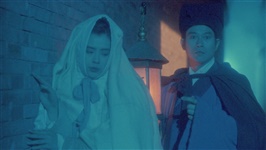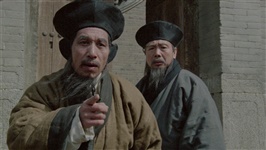Painted Skin (1993)
.jpg)
A horny scholar bumps into a beautiful woman in an alley whilst wandering at night and takes her as a concubine, but a passing Taoist detects evil energies at work and the scholar soon realises his guest is not of this world.
King Hu was one of the most important and visionary directors of the 1960's and 1970's but his career floundered after 1980, whilst others like Tsui Hark had picked up the baton and run with it. Perhaps hoping to help out an idol, Tsui Hark turned to King Hu when he decided it was time to bring the wuxia genre back to Hong Kong screens in 1990, revitalising it with the sophisticated wirework and editing that Ching Siu-Tung pioneered in films like Duel To The Death and A Chinese Ghost Story.
Once production started the director and producer found that they did not have the same vision of what this should look like, and Tsui eventually replaced King Hu with multiple directors - most notably Ching Siu-Tung. Despite still getting top billing, apparently only one shot filmed by King Hu remains in the finished film.
PAINTED SKIN feels like King Hu's response to this - essentially his own spin on A CHINESE GHOST STORY. To be fair, this was not his first time adapting the work of Pu Songliang, and his own film Legend Of The Mountain is a notable precursor of ACGS.
Unfortunately the result seems to vindicate Tsui Hark's decision to replace him, as PAINTED SKIN feels decidedly antiquated. It's like King Hu is trying to say "This was good enough for 1978, I don't see what's changed"... unfortunately the answer is that the intervening 15 years had seen perhaps the most rapid evolution of action design and cinematic technique in history.
The film was probably hobbled by budget as well, with the grand finale being an almost literal smoke and mirrors show to disguise the fact not much is actually happening... but one that couldn't afford to buy any mirrors.
I assume the film was a flop, being so dated and primitive compared to the oversupply of similarly themed films audiences had available in 1993, a tame affair lacking the kind of crazy spectacle that films like Swordsman II offered. It certainly didn't lead to a triumphant return to the box office for its director, anyway.
It's a shame King Hu's final film is his least essential work. He was one of the most important directors to ever work in the martial arts genre, and compared to his glory days this is kind of pitiable.
It's worth watching because it is a King Hu film, and his body of work is worthy of study... but be prepared for disappointment.
Crew
| Director | |
|---|---|
| Action Director | |
| Writer | |
| Producer | |
| Soundtrack | |
| Assistant Director | |
| Cinematographer | |
| Art Director | |
| Editor |




